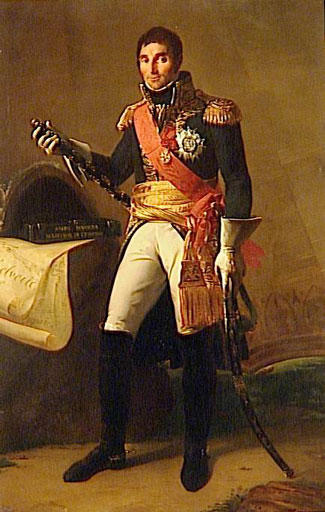The directory «Plots of stamps in the catalogue»
Massena Andre
(1756—1817)

Originally eager to go to sea, Andre Massena found life on the waves was not what it should be and so set out for a career in the French army. Very quickly he discovered he had made the right choice and rose rapidly to sergeant. Despite his promise, the army released Massena in 1789 and he took up smuggling on the Cote d'Azure. Within two years, however, the call of the drums took him back to the army and he joined the National Guard and was voted in as colonel. By 1793, he was a general of division and his abilities gave him first battle victory at Lonato in 1795. After that, Massena teamed up with a young General Napoleon Bonaparte and was a key soldier in the stunning 1796 Campaign and the battles of Montenotte, Lodi, Castiglione, Bassano, Caldiero, Arcola, and Rivoli. In 1799, Massena took command of the army in Switzerland and ran into Russia's Field Marshal Suvarov at the second battle of Zurich. Victorious, his reputation soared and even the harrowing siege and eventual surrender of his men at Genoa could not tarnish it. He succeeded Bonaparte as commander of the Army of Italy, but his unashamed looting required his almost instant dismissal. All was forgiven in time and in 1804 he became a marshal and a year later had taken Verona and fought at Caldiero. Given command of the campaign against Naples he was recalled, again for massive pillaging, and had his loot taken from him by the emperor. In the Danube campaign of 1809, Massena again put soldiering first and proved his abilities at Landshut, Eckmuhl, Ebelsberg, Aspern-Essling, Wagram and Znaim. His courage and skill at Aspern-Essling earned him the title Prince d'Essling. From Austria, Massena was moved to Spain, together with his mistress who dressed as a dragoon, and found himself sorely tested by British troops in the Peninsular War. His first taste was at Bussaco, where he was given a brutal lesson by the Duke of Wellington, and then again at Fuentes d'Onoro. Returning to France, Massena did not hold an active field command again, a harsh end for a talented, but flawed, leader.
Ajman, 1970, Battle of Rivoly
Equatorial Guinea, 1977, Battle of Rivoli
Gabon, 1969, Battle of Rivoly
Gabon, 1969, Oath of the Army
Monaco, 2008, Andre Massena
Yemen (Kindom), 1969, Battle of Rivoly
France,  Paris, post office on bd Massena
Paris, post office on bd Massena
France, 1958.05.06,  Levens. Massena
Levens. Massena